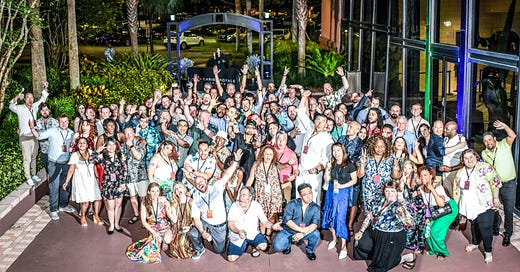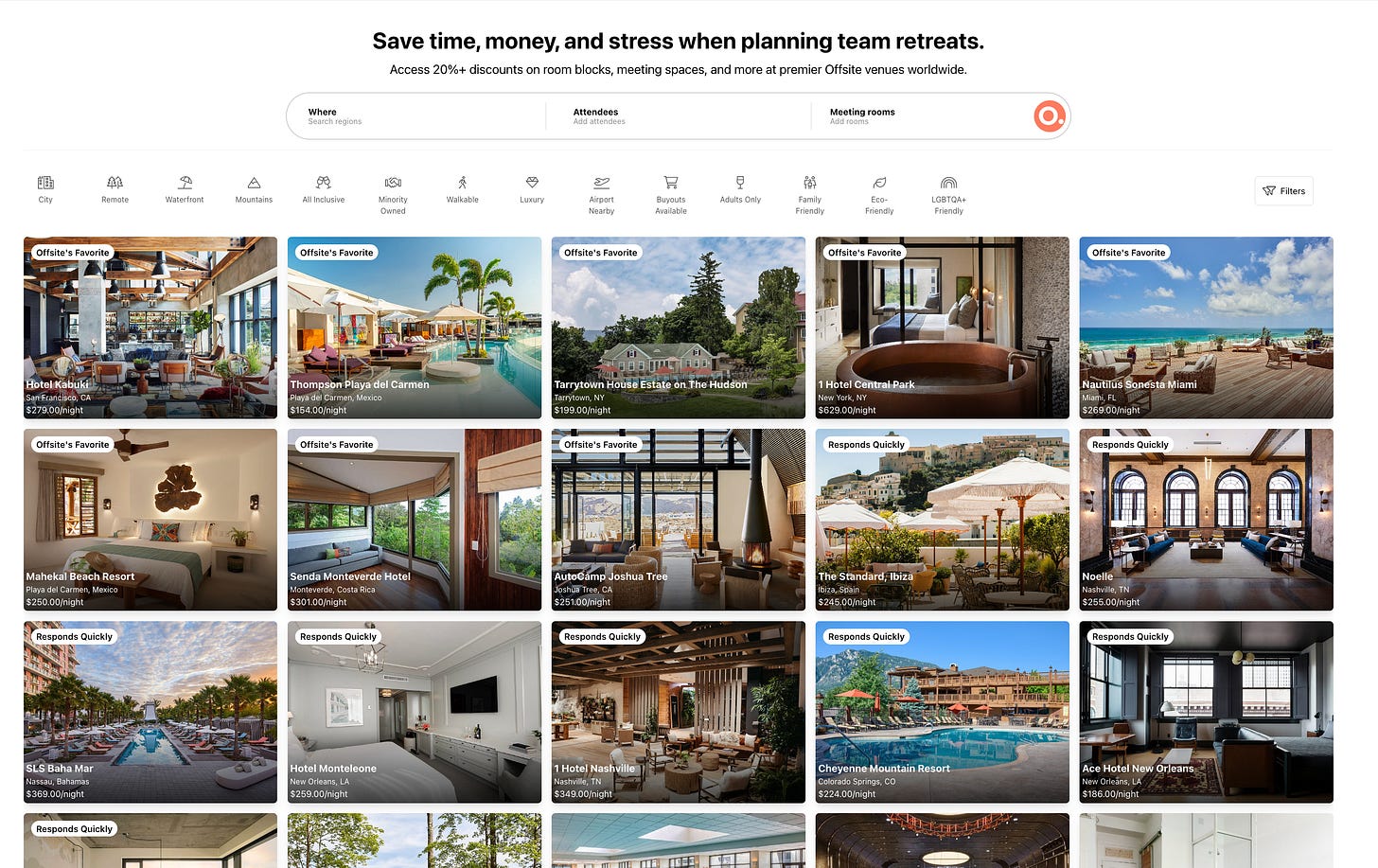Actionable Ways to Increase the ROI from Your Next Team Retreat
This guide will help you plan a more cost-effective, engaging, and transformational team retreat - whether you plan internally or work with a company like Offsite.
When planning a team retreat, most people think of the basics—finding a great venue, arranging travel, and scheduling a few team-building activities.
But if you want to achieve a high return on investment (ROI) from your retreat, you need to think beyond the basics.
You need a strategic approach that leverages every aspect of an offsite to drive real results for your team and organization.
At Offsite, we've planned hundreds of retreats for top companies worldwide (for clients like Buffer, Reforge, 15Five, Remote, HiBob, LifeLabs Learning, YPO, and many more), and we've refined our process to maximize the ROI of every event.
Here's how you can do the same, using some of the best practices we’ve developed over years of experience.
But a word of caution: while you could try to do this all on your own, you'll quickly realize that hiring an expert team like ours (or even starting with our free, curated, Airbnb-style marketplace might just save you time, money, and a lot of stress—all while leading to a higher ROI.
1. Start with Clear Objectives
Before you even think about venues or activities, you need to define what you want to achieve with your retreat.
Are you aiming to foster better communication, align your team on strategic goals, or simply reward them for their hard work?
Clear objectives will guide every decision you make, from the agenda to venue selection to choice of speakers or facilitators to hire.
Why It Matters: Defining clear objectives is the cornerstone of a successful retreat. Without a clear purpose, your retreat can quickly become a series of disconnected activities that may feel enjoyable in the moment but fail to produce lasting value for your team. When objectives are clear, every element of the retreat can be aligned to support them, ensuring that your team leaves with actionable takeaways that will benefit your organization long after the retreat ends.
Actionable Tip: Draft a simple yet focused retreat mission statement for the upcoming offsite. For example, "Our goal is to improve cross-departmental collaboration to accelerate product development timelines by 15%."
This will keep everyone aligned and focused on what truly matters. For example, at our upcoming offsite in two weeks, our goal is to plan our Q4 2024 OKRs while enrolling everyone in the initiatives and “next steps” to executing on our company-wide objectives.
Communicating these objectives to all attendees well in advance will allow everyone to arrive with a shared understanding of the offsite’s purpose.
For more on this subject, read:
2. Choose the Right Venue for Your Needs
The venue you choose sets the tone for the entire retreat. It’s not just about finding a beautiful location—it’s about finding a place that supports your objectives.
For instance, if team collaboration is a priority, opt for a venue with flexible meeting spaces and plenty of breakout areas. On the other hand, if relaxation and rejuvenation are your goals, a serene location with natural surroundings might be more appropriate.
Why It Matters: The environment you create for your team during the retreat can significantly impact their mindset and engagement. A well-chosen venue can inspire creativity, foster collaboration, and even help manage stress levels. Conversely, a poorly chosen venue can lead to logistical headaches, disengagement, and a retreat that fails to meet its objectives.
Actionable Tip: Look for venues that offer customizable packages and are experienced in hosting corporate events. This way, you can tailor the environment to your team’s specific needs. We often negotiate aggressive savings and concessions at venues that fit your budget and strategic goals, ensuring you get the most value for your spend. Also, consider accessibility, available amenities, and how the venue’s atmosphere aligns with your retreat’s purpose.
Offsite’s curated marketplace gives you immediate access to over 1000 premier venues worldwide that we’ve vetted and created profiles for, so you can quickly search based on your needs and budget, then send in booking requests which can save you up to 40% on retail rates for room blocks, meeting space, F&B, and more.
We can also help you source any other type of vendor (for flights, travel visas, swag, speakers, facilitators, activity providers, photographers, videographers, and more). If you’re in need of this support, please fill out this form and we’ll get back to you ASAP.
3. Design an Agenda That Maximizes Engagement
Your retreat agenda should be a strategic blend of work and play. A well-balanced schedule keeps participants engaged and prevents burnout.
Start with the end in mind—what do you want your team to walk away with?
Design sessions that are interactive and collaborative, but also leave time for relaxation and social bonding.
Why It Matters: The agenda is the backbone of your retreat. It determines how your team will spend their time and directly impacts their engagement levels. A poorly planned agenda can lead to boredom, fatigue, and missed opportunities for learning and collaboration. On the other hand, a well-crafted agenda can energize your team, foster meaningful connections, and drive the achievement of your retreat objectives.
Actionable Tip: Use “best practices” from companies that have achieved high ROI in their retreats. For example, include sessions that encourage cross-departmental collaboration or workshops that focus on skill-building aligned with your company’s goals. If you have data on which sessions were rated favorably by your team from past retreats, incorporate more of those sessions into your programming for the next retreat.
Don’t forget to build in time for informal interactions; some of the best ideas and connections happen during unstructured moments.
This is where our expertise in agenda creation really shines—we customize every agenda to maximize your retreat’s impact, based on your business objectives as well as any pre-offsite feedback we gather from your team (with your help).
Should you work with Offsite for end-to-end retreat planning, you can leverage our wealth of knowledge across team retreats for hundreds of other teams, many of whom had similar challenges to those you face today.
We can help you lead strategic planning sessions to execute on your quarterly/annual objectives, or how to deepen trust across the company, not just how to throw a great party or manage seamless logistics.
For some of the most popular and consequential types of offsites we help plan for, we have agenda templates you might find helpful.
Click here for Offsite’s All-Hands Agenda Template
Click here for Offsite’s Executive Team Retreat Agenda Template
Click here for Offsite’s Sales Kickoff Agenda Template
4. Leverage Pre-Work to Get the Most Out of Sessions
Sending out pre-work before the retreat can set the stage for productive sessions.
This could be anything from pre-reading materials to surveys that gauge your team’s expectations and needs.
This prep work ensures that everyone arrives with the right mindset and background knowledge, allowing you to dive deeper into discussions and decision-making.
Why It Matters: Pre-work helps your team hit the ground running when the retreat begins. It ensures that everyone is on the same page, which can save valuable time during sessions and lead to more meaningful and productive discussions. Pre-work also helps participants start thinking about the retreat’s topics in advance, which can spark creativity and innovative ideas.
Actionable Tip: Draft email templates for your pre-work, and make sure to follow up to ensure everyone completes it.
We often prepare pre-offsite surveys and suggested “pre-work” for company leaders to align the team before they even step foot on the venue. Consider asking participants to come prepared with specific challenges or goals they want to address during the retreat, which can make sessions more relevant and impactful.
Additionally, you can run strategic planning workshops virtually before your next offsite, or
5. Focus on Logistics—But Don’t Let Them Overwhelm You
The best-laid plans can fall apart if the logistics aren’t handled properly. From travel arrangements to dietary restrictions, every detail matters. This is where many DIY planners or teams who “plan internally” get overwhelmed, and for good reason.
Managing all these moving parts while trying to focus on the strategic elements of the retreat is a lot to handle. Not to mention, if you have other responsibilities, some part of your work is going to suffer. Will it be your normal job, or the offsite?
Why It Matters: Poor logistics can derail even the most carefully planned retreat. Missed flights, inadequate accommodations, or a lack of dietary options can cause frustration and distract from the retreat’s objectives. On the flip side, seamless logistics ensure that your team can focus fully on the retreat, knowing that everything else is taken care of.
Actionable Tip: Create a logistics checklist that includes every detail, from transportation to AV needs. Better yet, let experts like us handle this—our “done-for-you” logistics service ensures that nothing slips through the cracks, and you can focus on leading your team. We coordinate everything from hotel bookings to activity reservations, so you can be confident that your retreat will run smoothly.
6. Evaluate and Improve Post-Retreat
The retreat doesn’t end when everyone heads home. To truly maximize ROI, you need to evaluate the event’s success and identify areas for improvement.
Collect feedback from participants, analyze what worked and what didn’t, and use these insights to make the next retreat even better.
Why It Matters: Continuous improvement is key to increasing the ROI of your retreats over time. By evaluating each retreat and making adjustments based on feedback, you can ensure that each subsequent retreat is more effective and impactful. This iterative process allows you to refine your approach, address any challenges, and build on successes.
Actionable Tip: Send out a post-retreat survey to gather insights from your team. At Offsite, we conduct post-offsite debrief calls and surveys to fine-tune future events, ensuring each one is better than the last.
Consider holding a follow-up meeting a few weeks after the retreat to discuss how the outcomes are being implemented and to address any lingering issues.
Want More?
I could write for days on how to generate more ROI from your upcoming offsites.
Every company is different, and so the team at Offsite is committed to being a resource for you as you work to ensure your team(s) remain agile and ready to tackle whatever problems and opportunities come your way.
Email me anytime at jared@offsite.com, or visit offsite.com for client case studies to see how other companies are planning their offsites.
When you’re ready to plan your next offsite, make a free account at offsite.com to search our curated marketplace with over 1000 premier offsite venues.
If you want help sourcing any other type of vendor (for flights, travel visas, swag, speakers, facilitators, activity providers, photographers, videographers, and more), please fill out this form and we’ll get back to you ASAP.
Plus, we offer end-to-end offsite planning services if you want a “done for you” experience. See why companies like Buffer, Webflow, 15Five, Linear, HiBob, Metabase, Hampton, and others trust Offsite for their team retreats.
Thanks for reading!
-Jared
Like this article? Please share!







